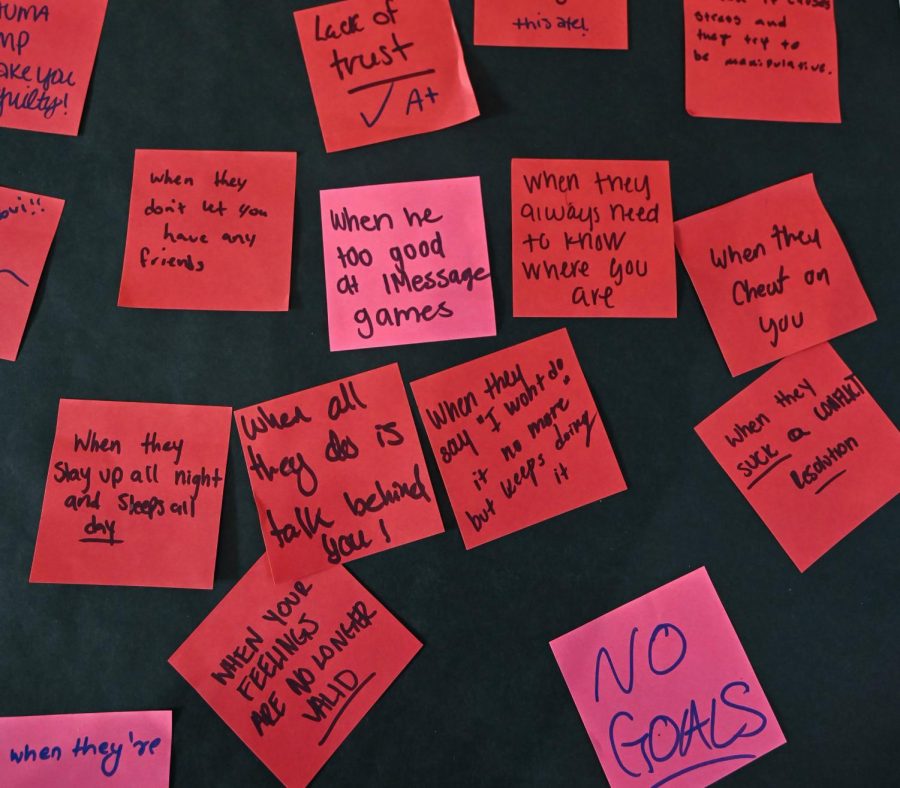Gen Z overlooks red flags
Students filled out Post-it notes with red flags in relationships during Eastfield’s red flag campaign.
March 7, 2023
Abuse isn’t just physical. It can hide behind faux acts of love, slowly manipulating its victims.
Associate of science major Justice Grant said trying to force her friend to see that the person they love wasn’t safe felt like an impossible task, especially when the toxicity of their partner was attempting to close their open line of communication.
“My friend would feel guilty every time she got upset with something her boyfriend did or said because of how much he spoiled her at other times,” Grant said. “She eventually stopped telling me the bad stuff because she thought she was overreacting. I think she thought she was forcing [her friends] to dislike him when he didn’t deserve it.”
Sometimes family and friends may not speak up at all.
“I would work in emergency shelters, and I noticed a lot of common trends,” said Sheyla Camacho, a public health educator with Parkland Hospital. “The victims would ask, ‘Well, why didn’t someone say something to me sooner? Why didn’t anybody talk to me about these red flags?’”
Gaslighting, love-bombing and other relationship “red flags” are finding their way into the spotlight with the rise of social media such as TikTok and relationship health campaigns like the one held at Eastfield for sexual violence awareness month.
Throughout February, students were asked to share the relationship “red flags” they look out for on sticky notes to spread the word about unhealthy and violent relationship behavior.
Camacho said she realized that there wasn’t enough education about the issue to help people, like Grant and her friend, avoid these abuses. She now travels around Dallas County to speak with anybody who will listen.
Gaslighting is a form of psychological manipulation where the abuser attempts to sow self-doubt and confusion in their victim’s mind.
“They will try to make you feel crazy for having a normal response to something crazy they did,” Camacho said.
She said victims can start to question their sanity and perceptions of reality.
Comparing their unhealthy relationship to physically abusive couples can reinforce the idea that they don’t have it that bad, and that it could always be worse.
Love-bombing, another toxic behavior, can be difficult to understand when it’s happening to you, Camacho said.
She defines it as “when a person you are dating moves at lightning speed, taking things way too seriously way too early in the relationship.”
However, according to a blind study that surveyed 1,000 Americans on dating apps, seven out of 10 Gen Z participants said they would prefer to be in a relationship that has love-bombing compared to dating someone who is not committed.
“We’re starting to see this uptick in thinking that ‘I’d rather have someone give me an overwhelming amount of love and affection versus me having to work on that communication skill.’ But this is unfortunately extremely toxic since everything moves so quickly,” Camacho said.
Grant started to notice her friend retreating as the relationship got more serious. When she asked questions and brought up concerns about her friend’s boyfriend, she would be shut out.
Love-bombing can include excessive gift-giving, which can seem like an act of kindness instead of a manipulation technique at first.
Psychology major Layla Torres saw her own mother fall victim to this.
“My dad left when I was a baby, and my mom told me he wasn’t a nice guy,” Torres said. “So, when she started dating a new guy when I was a teenager, and he bought her flowers all the time and even got me candy and new clothes and stuff, I really thought he was cool.”
But as time went on, she started to question his real intentions.
“My mom would be crying in the kitchen because of something he said or did, but then two days later she would act like nothing ever happened. Like he was the best person ever,” Torres said. “I couldn’t stand it. He made her feel like dirt until he bought her something new to try to prove that he wasn’t a bad guy.”
Camacho recommends learning about what red flags to look out for, but also says that sometimes there are less obvious “yellow flags” to be aware of as well.
Guilt tripping, dismissing your concerns, silent treatment and saying “all the right things” aren’t usually the in-your-face threats people are used to watching out for, Camacho said. But they can tingle your gut instincts for a reason.
Toxic relationships or behaviors have cropped up in the media, such as in memes or in analyses of movie or TV characters. There is a history of glamorizing toxic relationships, such as Cassie and Nate in “Euphoria,” as explained in a March 2022 Cosmopolitan article.
“When someone is exhibiting examples of yellow flags or red flags, we’ve realized that there is a trend of trying to sell it as a funny kind of relationship,” Camacho said. “When in reality people do end up getting hurt, maybe not physically, but there is so much emotional scarring and verbal abuse.”
Watching out for these emotionally abusive flags is step one. But if someone has already fallen victim to such behaviors, Camacho says the key is believing them.
“Don’t judge them,” she said. “As much as we want to speak honestly and just tell them to get rid of this person, there’s a lot of manipulation that goes into very toxic relationships. So just be very honest with ourselves and know about your resources, and guide them to the experts. And know your limits. If all you can offer is a hug and a judgment-free zone, do that. And hold their hand while they work through it with the professionals who are trained for this.”





